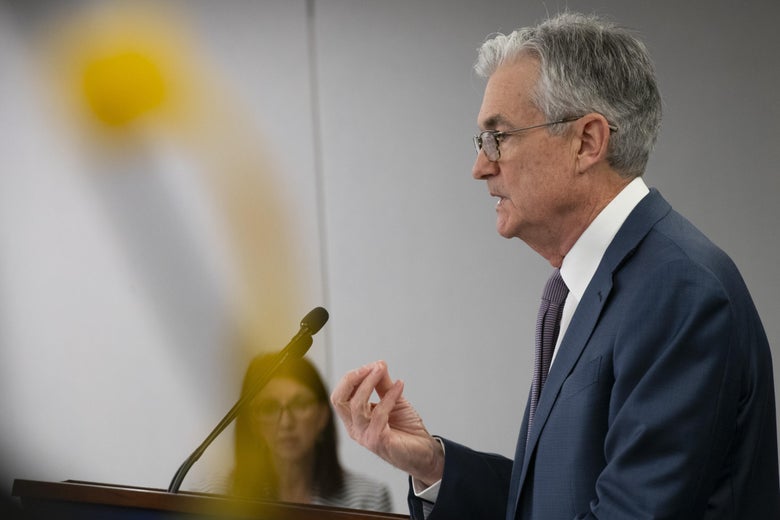
He’s doing his best.
Mark Makela/Getty Images
We appear to have reached the stage where just about everybody is terrified of what the coronavirus epidemic will do to the economy.
The Federal Reserve pulled the fire alarm this weekend, announcing that it would cut interest rates to near zero and take other emergency measures that it last used during the 2008 financial meltdown. The U.S. stock market responded to this news on Monday with its worst trading session since 1987, during which the S&P 500 plummeted by around 12 percent. Economists at the UCLA Anderson School of Management think the economy has already stopped growing, and will contract at a 6.5 percent rate next quarter (Goldman Sachs thinks 5 percent). Former White House economist Kevin Hassett, a relentless optimist if there ever was one, told CNN that the world faced close to a 100 percent chance of recession, and April could bring 1 milion job losses. Even President Trump momentarily lowered his reality distortion field and admitted the nation “may” be headed for recession. His former aide Gary Cohn thinks we’re probably at the start of one already.
One of the few people who does not appear to be particularly ruffled is Larry Kudlow, the former TV talking head who is now Trump’s top economic adviser. He told reporters that any downturn would be brief—a mere “weeks and months.” This is worrisome, since Kudlow is notoriously wrong about everything. He is the George Costanza of economic forecasters: Whatever the man predicts, it is safe to expect the opposite.
In other words, the conventional wisdom is absolutely correct: Everybody should be terrified about what’s coming. Our public health officials have no idea how long this crisis might last. But China just released a batch of data showing that the fight against COVID-19, which required mass lockdowns throughout the country, basically demolished its economy over the past several months. Here in the U.S., we’re already seeing early signs of the virus’ economic toll. On Saturday night, restaurants had 40 percent fewer diners compared a year before, according to Open Table. And that was before New York City and Washington State closed all of theirs down. More than 12 million Americans work in restaurants, bars, and fast food. It’s not hard to see where all this is going. Our economy is headed into strange, fluish hibernation.
The one upside to all this fear is that it’s spurring action. The Fed has risen to the occasion, both by slashing rates early and by announcing a massive bond-buying spree to prevent a serious credit crunch from developing. Nobody—least of all the central bank itself—thinks these moves will be enough on their own to prevent the economy from sliding into recession, which is part of why the stock market fell in response. (On Sunday, Chairman Jerome Powell all but begged Congress to take action, calling a fiscal response “critical.”) But its swift maneuvering may at least prevent that downturn from creating a full-fledged financial crisis, like we saw in 2008.
There could even be hope in Congress. The original relief bill that the House and White House negotiated to expand sick pay and medical leave may have been woefully insufficient, seeing as it only covered a fraction of the workforce. But now, both Republicans and Democrats in the Senate are talking about more dramatic action. Like some left-wing members of the House, Utah Sen. Mitt Romney wants to send $1,000 checks to every adult, which would help tide families over and buoy the economy a bit. Sen. Tom Cotton of Arkansas also says he wants to get more cash into the hands of affected workers. The pressure in Congress to do something dramatic seems to be growing along with the sense of danger. Meanwhile, the White House says that it is aiming for $800 billion in total stimulus. Half of that would come from a payroll tax cut that practically nobody outside the administration seems to support, because it targets the people who’d need it least. But if the administration can come to an agreement with Congress, a large, spending package could both make the recession shallower and shorter, sparing us all a long slog to recovery once the virus has been contained.
Everyone is frightened. But as a result, Washington might, conceivably, pull its act together to prevent some economic pain. Let’s hope.
Readers like you make our work possible. Help us continue to provide the reporting, commentary and criticism you won’t find anywhere else.
Join Slate Plusfrom Slate Magazine https://ift.tt/38SgQs1
via IFTTT
沒有留言:
張貼留言